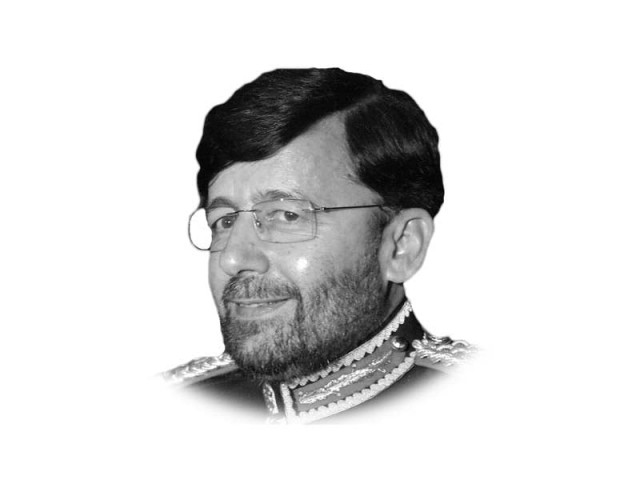The new COAS
Lt Gen Qamar Javed Bajwa appointed as the 16th COAS

The writer is a retired major general who served on various security/terrorism assignments. He has worked closely on different positions with the Chief of Army Staff designate
The appointment of the COAS Pakistan Army is seen across the world as an extraordinary event, hence receives exceptional coverage. This is mainly on two counts; first of all, internationally, Pakistan being a nuclear power and the control of these assets being in the hands of armed forces, the COAS is seen as the most powerful man calling the shots. Besides, the war on terror has put the Pakistan Armed Forces in the forefront of international war on terror. Secondly, where the army has a history of playing political role, the political leadership always takes the appointment of the COAS as endeavouring to elevate a person having positive disposition towards democratic process. The appointment of General Bajwa has been widely applauded both by the civil and ex-military analysts on various counts. Knowing General Bajwa for over three-and-a-half decades, I consider his elevation as the most miraculous decision for the country and the army.
Firstly, General Bajwa is a highly competent professional officer with rich experience of our eastern front. Secondly, as an exceptionally humble and approachable officer, he is going to keep the army well motivated while keeping a very happy team around him. Maintaining a very pleasant personality he is the best choice for ensuring very comfortable civil military relations. Having said that, the new COAS is taking over the charge at a moment when the country is faced with numerous challenges most of these he will find on his table on assumption of responsibilities. General Raheel Shareef is leaving behind a very strong legacy of a most popular army chief which General Bajwa will be expected to maintain and take it to new heights. Also, General Bajwa faces the challenge of not only consolidating the gains of Zarb-e-Azb but vigorously pursuing it to take it to its logical conclusion.

The biggest challenge to him in this regard will be to persuade the government to play its part of the NAP more efficiently. Another imperative challenge he will have to face would be to manage the escalation along the LoC by our eastern neighbour in connivance with international players. His prolonged exposure to the region due to his extensive employment in various capacities will come handy in effective management of the situation. Yet another important challenge for the new COAS will be the planned execution of the multi-billion dollar China-Pakistan Economic Corridor amidst increasing domestic, regional and extra-regional challenges. General Shareef has unequivocally aired his feelings, expressing his unwavering commitment towards the success of the CPEC. This will remain a major challenge for the new COAS.
The Pakistan army is engaged in the war on terror for the last 15 years which it has fought successfully at a great cost. While the armed forces maintain exceptionally high morale, prolonged involvement is not only putting the army under stress but also keeping it away from its conventional preparedness. The new COAS will face the challenge to expedite the process of completing operations along the western front and extricating the army handing over the border security to Civil Armed Forces. Effective engagement with Afghanistan in this regard is an inescapable necessity.
Additionally, General Bajwa is known to be extremely humane and possesses a troops-loving personality, hence there would be expectations associated with him to do more for the welfare of his officers and men. This will remain a major factor on his mind given his personality make-up. Institutionally, the new COAS will feel the burden to play an effective role in ensuring that the army is not subjected to unwanted media blitz attempting to undermine its reputation while at the same time expecting of him to take the Cyril Almeida news leak issue with the government to its logical end.
Having identified challenges for the new COAS, what should be his priority? As a first step, civil military relations must be brought to their acceptable level of trust. This is very important given the current challenges along the LoC and our focus on the war on terror. Given the domestic, regional and international challenges, the dream of CPEC coming to fruition will be contingent on a very robust security regime in place. The administrative measures in raising the required force in concert with the government need to be addressed with priority. Finally, he must extend all possible support to the government in effective engagement with the Afghan government for improving our bilateral relations. In this regard the upcoming China, Russia, Pakistan initiative to address the Afghan imbroglio be seriously pursued. Given the challenges and opportunities, the new COAS starts his assignment on a solid foundation provided to him by his predecessor General Raheel Shareef. May Allah guide him.
Published in The Express Tribune, November 29th, 2016.
Like Opinion & Editorial on Facebook, follow @ETOpEd on Twitter to receive all updates on all our daily pieces.















COMMENTS
Comments are moderated and generally will be posted if they are on-topic and not abusive.
For more information, please see our Comments FAQ